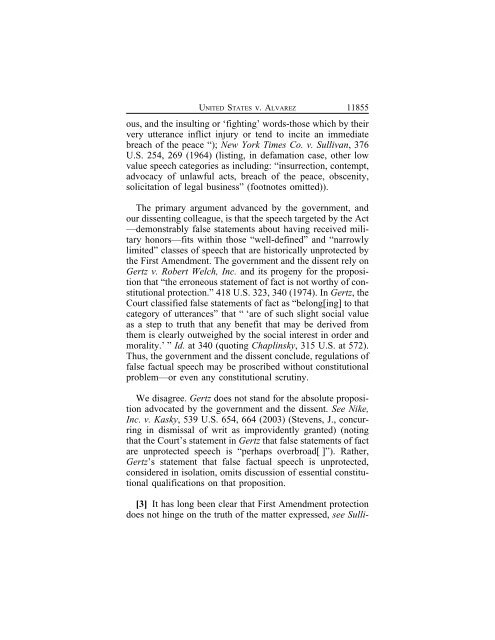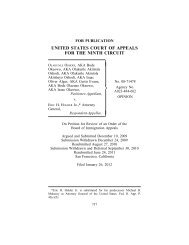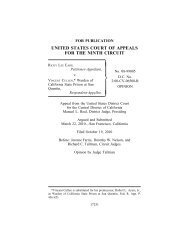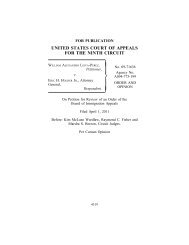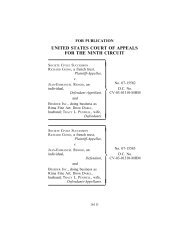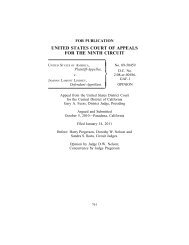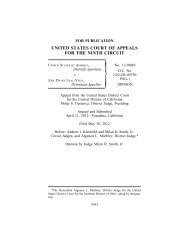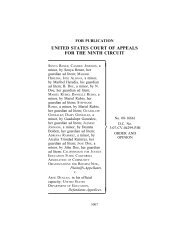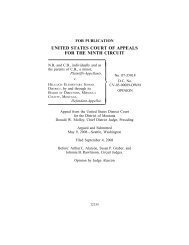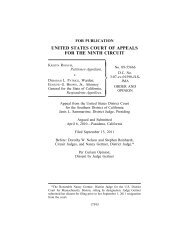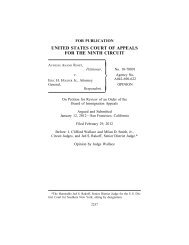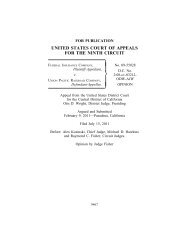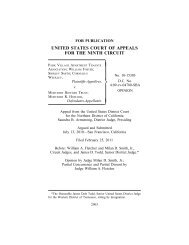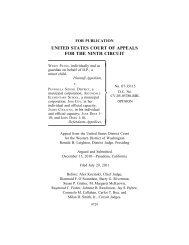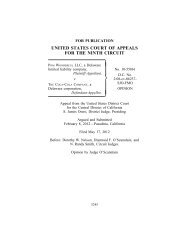USA v. Xavier Alvarez - Ninth Circuit Court of Appeals
USA v. Xavier Alvarez - Ninth Circuit Court of Appeals
USA v. Xavier Alvarez - Ninth Circuit Court of Appeals
Create successful ePaper yourself
Turn your PDF publications into a flip-book with our unique Google optimized e-Paper software.
UNITED STATES v. ALVAREZ<br />
11855<br />
ous, and the insulting or ‘fighting’ words-those which by their<br />
very utterance inflict injury or tend to incite an immediate<br />
breach <strong>of</strong> the peace “); New York Times Co. v. Sullivan, 376<br />
U.S. 254, 269 (1964) (listing, in defamation case, other low<br />
value speech categories as including: “insurrection, contempt,<br />
advocacy <strong>of</strong> unlawful acts, breach <strong>of</strong> the peace, obscenity,<br />
solicitation <strong>of</strong> legal business” (footnotes omitted)).<br />
The primary argument advanced by the government, and<br />
our dissenting colleague, is that the speech targeted by the Act<br />
—demonstrably false statements about having received military<br />
honors—fits within those “well-defined” and “narrowly<br />
limited” classes <strong>of</strong> speech that are historically unprotected by<br />
the First Amendment. The government and the dissent rely on<br />
Gertz v. Robert Welch, Inc. and its progeny for the proposition<br />
that “the erroneous statement <strong>of</strong> fact is not worthy <strong>of</strong> constitutional<br />
protection.” 418 U.S. 323, 340 (1974). In Gertz, the<br />
<strong>Court</strong> classified false statements <strong>of</strong> fact as “belong[ing] to that<br />
category <strong>of</strong> utterances” that “ ‘are <strong>of</strong> such slight social value<br />
as a step to truth that any benefit that may be derived from<br />
them is clearly outweighed by the social interest in order and<br />
morality.’ ” Id. at 340 (quoting Chaplinsky, 315 U.S. at 572).<br />
Thus, the government and the dissent conclude, regulations <strong>of</strong><br />
false factual speech may be proscribed without constitutional<br />
problem—or even any constitutional scrutiny.<br />
We disagree. Gertz does not stand for the absolute proposition<br />
advocated by the government and the dissent. See Nike,<br />
Inc. v. Kasky, 539 U.S. 654, 664 (2003) (Stevens, J., concurring<br />
in dismissal <strong>of</strong> writ as improvidently granted) (noting<br />
that the <strong>Court</strong>’s statement in Gertz that false statements <strong>of</strong> fact<br />
are unprotected speech is “perhaps overbroad[ ]”). Rather,<br />
Gertz’s statement that false factual speech is unprotected,<br />
considered in isolation, omits discussion <strong>of</strong> essential constitutional<br />
qualifications on that proposition.<br />
[3] It has long been clear that First Amendment protection<br />
does not hinge on the truth <strong>of</strong> the matter expressed, see Sulli-


